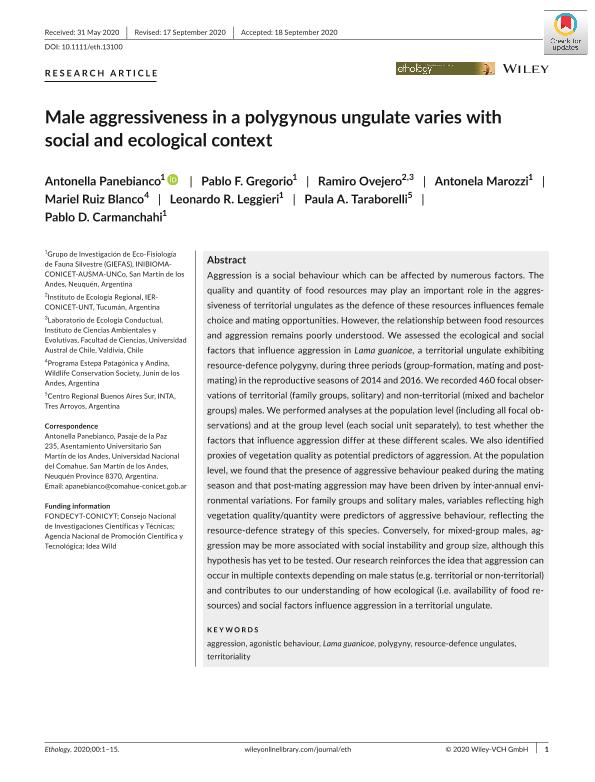Artículo
Male aggressiveness in a polygynous ungulate varies with social and ecological context
Panebianco, Antonella ; Gregorio, Pablo Francisco
; Gregorio, Pablo Francisco ; Ovejero Aguilar, Ramiro Jose Antonio
; Ovejero Aguilar, Ramiro Jose Antonio ; Marozzi, Antonela Alejandra
; Marozzi, Antonela Alejandra ; Ruiz Blanco, Cynthia Mariel
; Ruiz Blanco, Cynthia Mariel ; Leggieri, Leonardo Ramón
; Leggieri, Leonardo Ramón ; Taraborelli, Paula Andrea
; Taraborelli, Paula Andrea ; Carmanchahi, Pablo Daniel
; Carmanchahi, Pablo Daniel
 ; Gregorio, Pablo Francisco
; Gregorio, Pablo Francisco ; Ovejero Aguilar, Ramiro Jose Antonio
; Ovejero Aguilar, Ramiro Jose Antonio ; Marozzi, Antonela Alejandra
; Marozzi, Antonela Alejandra ; Ruiz Blanco, Cynthia Mariel
; Ruiz Blanco, Cynthia Mariel ; Leggieri, Leonardo Ramón
; Leggieri, Leonardo Ramón ; Taraborelli, Paula Andrea
; Taraborelli, Paula Andrea ; Carmanchahi, Pablo Daniel
; Carmanchahi, Pablo Daniel
Fecha de publicación:
10/2020
Editorial:
Wiley Blackwell Publishing, Inc
Revista:
Ethology
ISSN:
0179-1613
Idioma:
Inglés
Tipo de recurso:
Artículo publicado
Clasificación temática:
Resumen
Aggression is a social behaviour which can be affected by numerous factors. The quality and quantity of food resources may play an important role in the aggressiveness of territorial ungulates as the defence of these resources influences female choice and mating opportunities. However, the relationship between food resources and aggression remains poorly understood. We assessed the ecological and social factors that influence aggression in Lama guanicoe, a territorial ungulate exhibiting resource-defence polygyny, during three periods (group-formation, mating and postmating) in the reproductive seasons of 2014 and 2016. We recorded 460 focal observations of territorial (family groups, solitary) and non-territorial (mixed and bachelor groups) males. We performed analyses at the population level (including all focal observations) and at the group level (each social unit separately), to test whether the factors that influence aggression differ at these different scales. We also identified proxies of vegetation quality as potential predictors of aggression. At the population level, we found that the presence of aggressive behaviour peaked during the mating season and that post-mating aggression may have been driven by inter-annual environmental variations. For family groups and solitary males, variables reflecting high vegetation quality/quantity were predictors of aggressive behaviour, reflecting the resource-defence strategy of this species. Conversely, for mixed-group males, aggression may be more associated with social instability and group size, although this hypothesis has yet to be tested. Our research reinforces the idea that aggression can occur in multiple contexts depending on male status (e.g. territorial or non-territorial) and contributes to our understanding of how ecological (i.e. availability of food resources) and social factors influence aggression in a territorial ungulate.
Archivos asociados
Licencia
Identificadores
Colecciones
Articulos(IER)
Articulos de INSTITUTO DE ECOLOGIA REGIONAL
Articulos de INSTITUTO DE ECOLOGIA REGIONAL
Citación
Panebianco, Antonella; Gregorio, Pablo Francisco; Ovejero Aguilar, Ramiro Jose Antonio; Marozzi, Antonela Alejandra; Ruiz Blanco, Cynthia Mariel; et al.; Male aggressiveness in a polygynous ungulate varies with social and ecological context; Wiley Blackwell Publishing, Inc; Ethology; 127; 1; 10-2020; 68-82
Compartir
Altmétricas



